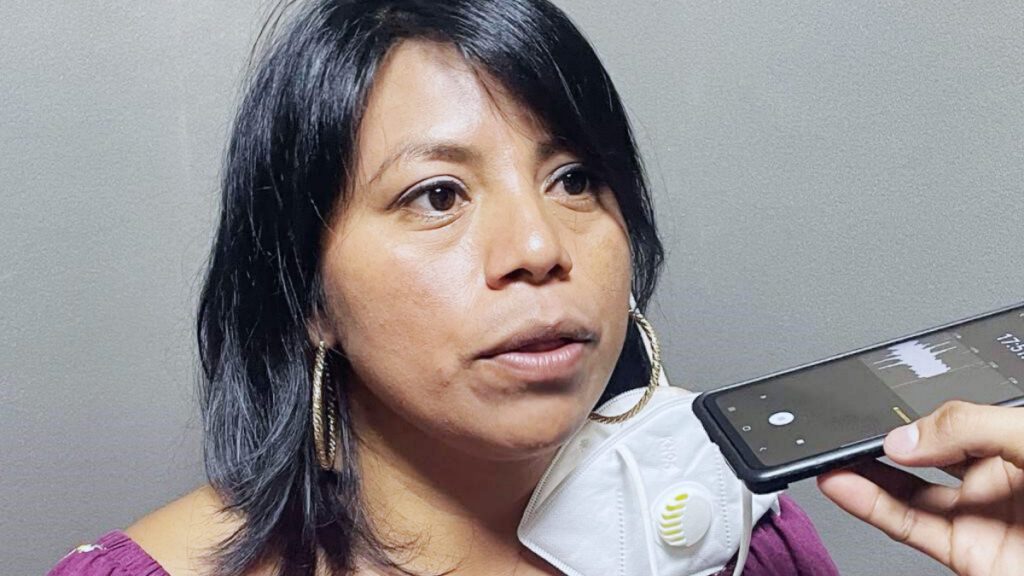By Minaz Kerawala, Communications and Public Relations Advisor


United Nations Human Rights Council Resolution 21/12 “Calls upon States to promote a safe and enabling environment for journalists to perform their work independently and without undue interference, including by means of legislative measures ….” In Honduras, however, legislative measures have been used to persecute rather than protect a journalist.
A voice from below
Sonia Pérez is part of a network of grassroots Honduran journalists trained and mentored by the Equipo de Reflexión, Investigación y Comunicación (ERIC) and Radio Progreso, with the support of Development and Peace ― Caritas Canada. These community correspondents serve a vital social function, reporting from remote areas on issues and events affecting impoverished peasant and Indigenous peoples.
Pérez’s journalism draws on the training she received through a rural human rights diploma program run by CEHPRODEC, another of our Honduran partners.
An eviction and an arrest
On May 18, 2022, Pérez went to cover a police operation in San José, in the La Paz Department. Following a complaint by Juan Argueta, a powerful local businessman, the Public Prosecutor’s Office had ordered the eviction of a Lenca Indigenous community from its lands in Nueva Palestina.
That day, 70 National Police officers, accompanied by some 200 of Argueta’s employees, violently executed the eviction order, destroying homes, irrigation facilities and foodgrain stocks. They also arrested Pérez and 30 others on charges of usurpation and the illegal modification of boundaries.
Radio Progreso challenged Argueta’s claim on the land, citing the National Agrarian Institute’s 1999 recognition of the local Lenca Indigenous Council’s title to it and denounced Pérez’s arrest for simply doing her job (article in Spanish). The Public Prosecutor’s Office insisted it was not criminalizing Pérez for her journalism but prosecuting her for her alleged role in a complex land dispute (statement in Spanish).
A pattern of abuse
Pérez’s supporters counter that clubbing a journalist with her subjects is itself abusive. She is being defended by ERIC’s lawyer, Dunia Pérez, who said, “There is no doubt that criminal law is used to deter legitimate resistance by Indigenous communities and peoples defending their territories. The Inter-American Human Rights Commission and the United Nations High Commissioner for Human Rights have expressed concern about a pattern of the misuse of the criminal justice system in Honduras.”
All I have done is cover the truth…. But I now feel impotent, threatened and slandered for my work.
Sonia Pérez, correspondent, Radio Progreso
Last year, Development and Peace had highlighted CEHPRODEC’s defence of Víctor Vásquez, a Lenca leader who was similarly legally persecuted for resisting a land-grab.
A measure of justice
On June 15, a court released Pérez and the other detainees from jail on conditions that included not contacting one another or Argueta, staying off the disputed land and regularly signing a police register (article in Spanish). A human rights collective noted that this effectively muzzled Pérez, who asserted that although she was ethnically Lenca, she was not a member of the council (article in Spanish).
ERIC continued fighting the case tirelessly while Radio Progreso publicized it nationally. Then, the Committee to Protect Journalists and the Coalition For Women In Journalism brought international attention to the matter.
Finally, in late June, a court vacated the charges against Pérez and her co-accused, ruling that they were based in a retroactive misapplication of the law and a failure to recognize the Lenca people’s land title (article in Spanish).
Relieved, Pérez reiterated, “I know the guys from the Indigenous council, and their struggle is a just one. They have lived on their lands from generation to generation, and the lands belong to them.”
A continuing threat
Despite the vindication, Radio Progreso reported in August that the Lenca community remains fearful for its land tenure and is struggling to recover from the disruption and destruction that the eviction caused (article in Spanish).
Pérez’s privations, too, have not ceased. She is being harassed by hostile media who have bought into Argueta’s narrative. She has also noticed intimidating strangers prowling around her neighbourhood. Fearing for her family’s safety, Pérez even moved from home temporarily. Another constant fear is that there may be an appeal against her acquittal.
“All I have done is cover the truth, and report a news story,” Pérez said. “But I now feel impotent, threatened and slandered for my work.”
Our response
ERIC-Radio Progreso is part of our ongoing Voices Without Borders in Defence of Lives and Lands project funded by Quebec’s Ministère des Relations internationales et de la Francophonie under its Nouveau Québec sans frontières program.
Latin America programs officer Mary Durran said, “This project supports defenders of rights like Sonia Pérez. It is training a network of rural correspondents in Honduras to cover issues concerning poor, remote communities that commercial media often ignore in addition to helping threatened journalists. This is an important contribution to independent journalism.”
Thanks to ERIC’s efforts, Pérez was admitted into a government program for threatened human rights defenders in July. This gives her access to a dedicated police helpline. Unfortunately, such nominally protective measures have proven ineffective in the past.
That is why Development and Peace’s executive director, Carl Hétu, wrote to Elizabeth Williams, Canada’s ambassador to Honduras, urging her to raise Pérez’s case with the Honduran government. He framed this request in the context of Canada’s commitment “to defend human rights and freedom of the press.”
Grateful for this support, Pérez said, “Your concern for my fate makes me feel better. It makes me feel that I am not alone; that my work has not been in vain.”
How you can help
You can help Sonia Pérez by sharing her story widely to raise her profile. Also ask your local animator about sending her messages of solidarity.
To help protect rights defenders on a larger, more global scale, please back our petition calling Canada to adopt strong laws to prevent its corporations from abusing human and environmental rights overseas.

